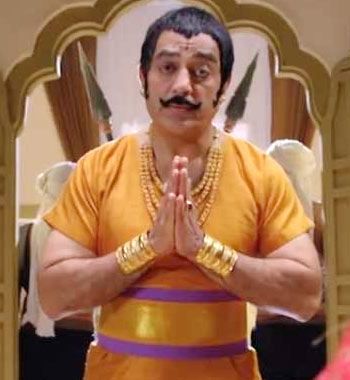 Kamal Haasan's Uttama Villain is a thought-provoking period comedy that revolves around an aging superstar forced to face his own mortality, says S. Saraswathi.
Kamal Haasan's Uttama Villain is a thought-provoking period comedy that revolves around an aging superstar forced to face his own mortality, says S. Saraswathi.
There is nothing like nearing the end of your life and knowing that death is coming, to bring you crashing down to earth. It helps put everything in perspective.
Kamal Haasan's much-awaited Uttama Villain attempts to bring home this truth.
Manoranjan (Kamal Haasan) is a huge film star totally drunk on his success.
He has everything -- a spectacular career, a happy married life, a beautiful lover and a rich father-in-law to produce his every film.
He is at the height of his popularity when his life is shattered by two startling revelations.
He is diagnosed with a brain tumour in an advanced stage and given just a few months to live. He also discovers that he has a daughter from his first love, a woman he still has feelings for.
Mano knows that his death is imminent, but the artist in him wants to live forever. To accomplish this, he goes back to his mentor, Marghadarsi (played by the late director Balachander), to give him one last film that will keep the memory of both of them alive forever.
Marghadarsi retorts that he cannot work with someone who is no longer an actor, but a star with a halo around his head.
Eventually, though, he relents, and thus begins a movie within a movie, a comedy titled Uttama Villain.
Only this time the hero, Uttaman, is an 8th century theatre artist, who is believed to have mastered the secret to eternal life.
Even while the main film slowly unfolds the tragic drama and turmoil in the life of the actor, his antics as a theatre artist lightens the mood and creates a disparity between the two characters.
The songs and background score by M Ghibran takes the film to a whole new level. Shamdat Sainudeen's camerawork is equally brilliant.
M S Bhaskar as Kamal's loyal manager gives an incredible performance and so does the legendary K Balachander.
But the film is incredibly slow and at almost three hours, seems too long.
Urvashi as Kamal's wife gives a good performance. Pooja, as his co-star in the film, and Andrea Jeremiah as his friend, doctor and lover, are not as convincing.
Kamal essays two totally contrasting characters and is brilliant in both.
The narrative technique, that skilfully alternates between the two and their seemingly similar situations, is ingenious and a credit to director Ramesh Aravind.
On the downside, the comedy, with its highly exaggerated actions, gets tedious after a while. You also do not relate to Uttaman, who is so obviously unreal and there is too little of manoranjan to evoke any real empathy.
The film may not appeal to all, but the brilliance of Kamal Haasan, the master performer and Ghibran's stunning music make it worth watching.
Rediff Rating: 











 © 2025
© 2025